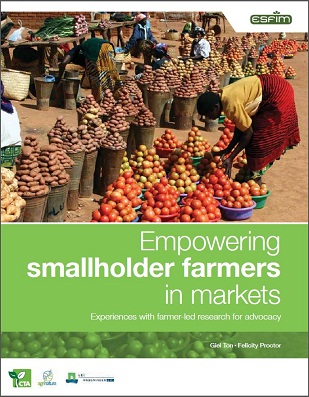
Empowering smallholder farmers in markets: experiences with farmer-led research for advocacy
Edited by Giel Ton and Felicity Proctor
AGRINATURA – CTA – LEI Wageningen UR
November 2013
www.esfim.org
Soft and hard copies through http://publications.cta.int/en/publications/publication/1767/
The Empowering Smallholder Farmers in Markets programme (ESFIM) creates a space for learning-by-doing on institutional modalities to bridge the gap between the research community and national farmer organisations on issues relating to smallholder market access. It generates research-informed proposals for change in the enabling/disabling institutional environment and it supports the capacities of national farmer organisations to engage in related advocacy activities. This book describes the dynamics in eleven countries that were included in the programme between 2008 and 2013. Context mattered and this is demonstrated in the diversity in themes prioritised and selected in each of the countries. These ranged from research on modalities of collective marketing to the generation of evidence on the impact of seed programmes, the design of market information systems and electronic trading systems to the legal and administrative hurdles that prevent smallholders from selling to government procurement programmes. The chapters give insight in the advocacy strategies of national farmer organisations and their use of research and evidence to strengthen the voice of smallholder farmers and formulate pro-active proposals for change.
Recommendations
“The authors are congratulated on how well they have set out their case. I trust that it will in turn inspire many others to actively link farmers and research in addressing the challenges of agricultural innovation.” Mark Holderness, Executive Secretary of the Global Forum on Agricultural Research (GFAR)
“Food should be produced in every country, according to a diversity of environments and potentialities, close to the consumers, close to the hungry and to the malnourished. Let us hope that the International Year of Family Farming 2014, will be able to obtain better public policies in favour of Family Farming. The experiences documented in this book show the dignity and the leadership of farmer organisations in advocating for such policies.” José Antonio Osaba García, Civil Society Coordinator of the IYFF-2014, Word Rural Forum (WRF)
“Too often the development community speaks on behalf of small-scale farmers, rather than allowing their voices to steer policy and research agendas around their priorities. This important book provides a counterpoint by describing the reality of building capacities of farmer federations to shape research and policy in favour of their members, at a time of rapid change in agricultural markets. The book is rich in lessons that result from a frank assessment of challenges involved in the research support process.” Bill Vorley, Principal Researcher Sustainable Markets, International Institute for Environment and Development (IIED)
“Poor formulation and implementation of policies are major constraints to development of the agricultural sector in many African, Caribbean and Pacific countries. One reason for this is the insufficient level of consultation with relevant non state actors - both the private sector and farmers- in agricultural policy processes. Moreover, even when consulted, farmer organisations are not well-equipped to contribute to policy debate because they often lack the necessary facts and figures to argue their case and do not have the resources to carry out the studies required to generate the needed information. More effective linkages between the research community and farmer groups is therefore highly desirable and this publication makes a major contribution to promoting such research.” Michael Hailu, Director of the Technical Centre for Agricultural and Rural Cooperation (CTA)
‘’The book is very informative and it presents the notion that farmers are naturally entrepreneurial but will need to be supported technically and with evidence to have the capacity to integrate into profitable value chains and more-so to provide leadership in agriculture policy discourse in Africa.’’ Stephen Muchiri, Chief Executive Officer, Eastern African Farmers Federation (EAFF)



